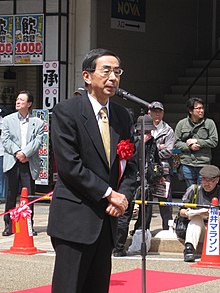Issei Nishikawa
Issei Nishikawa ( Japanese 西川 一 誠 , Nishikawa Issei , actually Nishikawa Kazumi ; born January 2, 1945 in Asahi (today: Echizen ), Fukui Prefecture ) is a Japanese politician and has been the governor of Fukui since 2003.
Nishikawa graduated from the Law Faculty of Kyoto University in 1968 and then became a civil servant in the Ministry of Self-Government , where he rose to leadership positions in the late 1980s. Most recently he was head of the planning department ( kikaku-ka ) from 1992 , and from 1994 deputy head of the secretariat of the Minister for State Land . In 1995 he became lieutenant governor of Fukui Prefecture under Yukio Kurita .
When Kurita retired in 2003 after four terms, Nishikawa applied for the successor in the unified regional elections in April, received around 53% of the votes and was able to beat the former diplomat Bundō Takagi and the communist Tomoichirō Yamakawa. In 2007 and 2011 , as a de facto all-party candidate, he was confirmed in office for a further four years only against one Communist opponent. As already under the predecessor Kurita z. B. After the incident in the fast breeder Monju , nuclear safety is a recurring topic of his election campaigns, especially after accidents, as Fukui is the prefecture with the most nuclear reactors (15) in the country.
Web links
- Issei Nishikawas Kōenkai (Japanese)
- Fukui Prefecture: Governor's Office (Japanese, Chinese, English, Portuguese)
- National Governors' Conference: Brief Biography
Individual evidence
- ^ Eric Johnston: Gubernatorial election '03. Pro, con or plebiscite. Fukui race boils down to reactor factor. In: The Japan Times . April 11, 2003, accessed April 18, 2011 .
- ↑ Safety of nuclear plants a key issue in governor elections. In: asahi.com . March 26, 2011, accessed April 18, 2011 .
| personal data | |
|---|---|
| SURNAME | Nishikawa, Issei |
| ALTERNATIVE NAMES | 西川 一 誠 (Japanese); Nishikawa Kazumi (real reading of name) |
| BRIEF DESCRIPTION | Japanese politician |
| DATE OF BIRTH | January 2, 1945 |
| PLACE OF BIRTH | Asahi (Fukui) , Fukui Prefecture |
